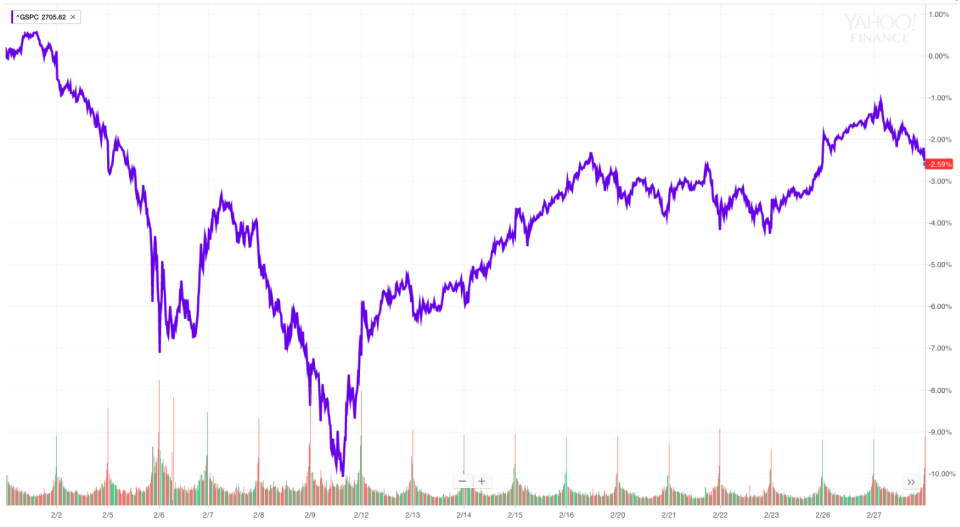GDP and Lowe's — What you need to know in markets on Wednesday
A tumultuous month for the stock market comes to an end on Wednesday.
On the final trading day of a month that, barring a big rally on Wednesday, will almost certainly see the major averages finish in the red, investors will contend with a fairly busy economics and earnings schedule after a Fed-heavy Tuesday in markets.
Through Tuesday’s close, the S&P 500 was down 2.6% for the month, the Dow was down just under 3%, while the tech-heavy Nasdaq was off about 0.8% for the month.

The biggest economics news out Wednesday will be the second estimate of fourth quarter GDP, which Wall Street economists tracked by Bloomberg expect will show the U.S. economy grew at an annualized pace of 2.5% in the final three months of 2017, down 0.1% from the initial estimate published in late January.
Elsewhere in economic data we’ll get readings on pending home sales and manufacturing activity in the midwest from the Chicago PMI report.
And on the earnings side, home improvement retailer Lowe’s (LOW), TJ Maxx parent company TJX Companies (TJX), Victoria’s Secret parent L Brands (LB), Monster Beverage (MNST), and salesforce.com (CRM) are expected to be the highlights on Wednesday.

Investors will also still be sifting through Tuesday’s run of Fed speak, with Fed chair Jerome Powell making the biggest waves, saying in testimony before the House committee on financial services that his view of the U.S. economy has improved since December.
Markets took Powell’s comments as a sign the Fed will upgrade its expectations for how many interest rate hikes it will carry out in 2018 when it releases a new set of economic projections along with its March 14 policy announcement. The Fed is expected to increase its interest rate target by 0.25% in its March statement.
Consumers and the economy
Consumer confidence is an important reading for the U.S. economy for a simple reason — most of GDP growth depends on consumer spending.
Financial markets, then, track this data closely and also worry that gyrations in asset prices like we saw earlier this month will derail what has otherwise been a positive view of the economy from U.S. consumers.
Except this hasn’t happened at all in February.
On Tuesday, The Conference Board’s consumer confidence reading for February hit its highest level since November 2000, confirming data that we saw from the University of Michigan’s survey earlier this month.
“Consumers’ assessment of current conditions was more favorable this month, with the labor force the main driver,” said Lynn Franco, director of economic indicators at The Conference Board.
Franco added that, “Despite the recent stock market volatility, consumers expressed greater optimism about short-term prospects for business and labor market conditions, as well as their financial prospects. Overall, consumers remain quite confident that the economy will continue expanding at a strong pace in the months ahead.”
For consumers, then, it seems that their view on the economy comes down to whether they have jobs and if they think they’ll make more money in the year ahead.
The Conference Board’s reading showed that the number consumer seeing jobs as “plentiful” increase to 39.4% in February from 37.2% the prior month, while those saying jobs are hard to get fell to 14.7% from 16.3%.
On Tuesday, Fed chair Jay Powell said the stock market is not the economy but it plays a factor in the economy; these recent consumer data points suggest how much of a factor the stock market plays certainly ebbs and flows.
After President Donald Trump was elected and the stock market rallied, Treasury Secretary Steven Mnuchin said the stock market would be a “report card” for how the administration’s economic proposals were working. And the broad argument that the stock market is in fact the economy hinges on the market reflecting investors’ long-term confidence in future corporate earnings growth, an outcome that almost necessarily cannot markedly diverge from the country’s broader economic fortunes.
The recent read from consumers indicates, however, that while the long-term fortunes of the market and the economy may well be tied together — and that higher asset prices could make consumers more confident leading to an increase in spending and thus more economic growth — when jobs are available and the hopes for higher wags are high it doesn’t really matter what the stock market is doing.
Consumers react to whether they can or can’t go to work, spend some money, save some money, and generally feel economically secure. For years after the financial crisis confidence remained low while the stock market hit new highs. Now, we may see this data diverge in the other direction.
—
Myles Udland is a writer at Yahoo Finance. Follow him on Twitter @MylesUdland
Read more from Myles here:
A few major topics were missing from Warren Buffett’s latest annual letter
The Trump tax cut earned Warren Buffett’s Berkshire Hathaway $29 billion in 2017
Goldman Sachs says U.S. economic data right now is ‘as good as it gets’
One candidate for Amazon’s next headquarters looks like a clear frontrunner
Tax cuts are going to keep being a boon for the shareholder class
Auto sales declined for the first time since the financial crisis in 2017

 Yahoo Finance
Yahoo Finance 
